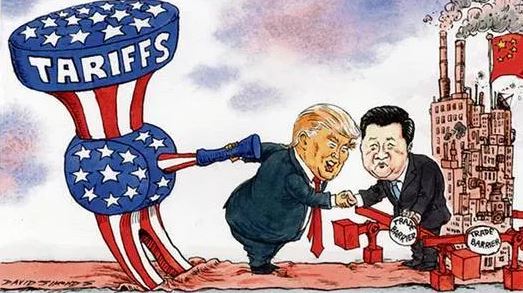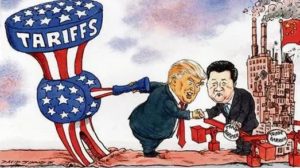China warned to prepare for being cut off from US dollar payment system
Mon 12:53 pm +01:00, 29 Jun 2020
By Frank Tang in Beijing
June 24, 2020 “Information Clearing House” – China must prepare for the risks of being cut off from the US dollar payment system in case the United States sanctions Chinese companies and banks, just like Washington did with Russian institutions, a senior Chinese financial regulator said on Monday.
Fang Xinghai, a vice-chairman at the China Securities Regulatory Commission, said that as China mainly relies on the US dollar payment system in international deals, it makes it vulnerable to possible US sanctions.
“Such things have already happened to many Russian businesses and financial institutions. We have to make preparations early – real preparations, not just psychological preparations,” Fang said at a forum organised by Chinese media outlet Caixin.
Fang’s comment came at a time when Washington is pondering how far it should go to use the US dollar’s key role in international payment to punish Chinese individuals, companies and financial institutions for alleged involvement in issues such as Xinjiang and Hong Kong.
The US dollar payments system, which is underpinned by infrastructure such as the SWIFT international payments messaging system and the Clearing House Interbank Payments System (CHIPS), is the backbone for international trade and investment.
Fang’s speech showed that Beijing policymakers are factoring US financial sanctions as a realistic risk as being cut off from the US dollar system could seriously hinder an entity’s capabilities of conducting international business.
The risk, though, is seen to be low that China will be treated in the same way as Russia, after the US responded to numerous events, including the “annexation” of Crimea by Russia in 2014.
According to a US congressional research service document, dated March 30, the US imposed sanctions on Russia “in response to its invasion of Ukraine, election interference, other malicious cyber activities, human rights abuses, use of a chemical weapon, weapons proliferation, illicit trade with North Korea, and support to Syria and Venezuela”.
US President Donald Trump, for example, confirmed he held off on imposing tougher sanctions on Chinese officials blamed for a crackdown on China’s Uygur Muslim minority in Xinjiang as he feared that such moves could affect trade negotiations with Beijing, according to an interview published on Monday by American news website Axios.
But, despite that, there are growing signs of financial decoupling between the world’s two largest economies.
The US has increased scrutiny of Chinese firms listed within its borders, and many US-listed Chinese companies, including Alibaba, NetEase and JD.com, have floated shares in Hong Kong. Alibaba is the owner of the South China Morning Post.
At the same time, Fang said the value of the US dollar is facing an uncertain future due to additional money being printed by the US Federal Reserve, posing risks to China’s holdings of US dollar-denominated assets.
China holds over US$2 trillion of outbound investment stock, having increased it by US$110.6 billion last year, a vast majority of which is located in developed countries and
China also holds US$1.07 trillion of US treasury bills.
“Yuan internationalisation is a must to offset external financial pressure,” Fang added. “If our overseas assets were held in yuan, there won’t be such worries [over US dollar devaluation].”
The Chinese government has been trying to boost the international use of yuan in the last decade. It has obtained a nominal “reserve currency” status after it was included in the basket underlying the Special Drawing Rights, an accounting unit at the International Monetary Fund, however, the real cross-border use of yuan is still limited compared to the US dollar.
The Chinese currency’s share of international payments dropped to sixth, or 1.79 per cent of the global share in May, far behind the US dollar on 40.88 per cent, the Euro on 32.9 per cent, and the Japanese yen on 3.53 per cent, according to SWIFT data.
Frank Tang joined the SCMP in 2016 after a decade of China economy coverage and government policy analysis. – “Source“ –
Post your comment below
| See also Risk of military conflict between US and China higher than ever, experts say Deutsche Bank warns that investors are souring on the dollar |
Source: http://www.informationclearinghouse.info/55271.htm











